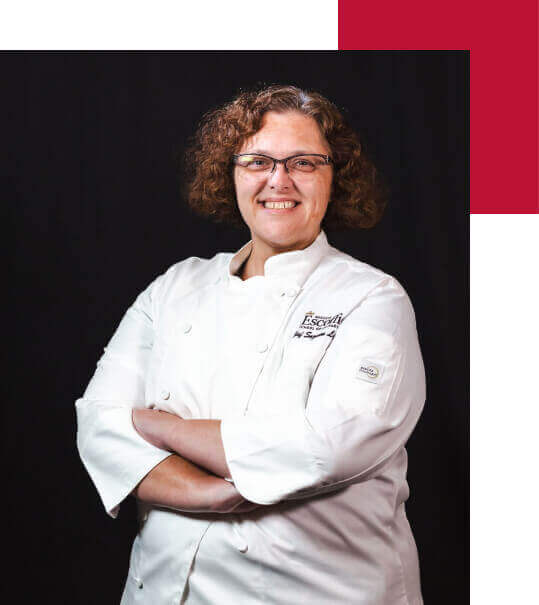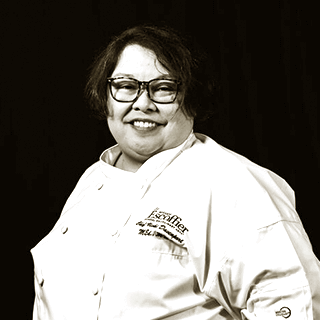HOSPITALITY & RESTAURANT OPERATIONS MANAGEMENT
Earn an online degree in hospitality & restaurant operations management at one of the best culinary schools in the USA.*
Explore More Programs
Discover the culinary speciality that’s right for you!
Online Programs
Austin Campus
Next start date: Apr 9
An online Hospitality & Restaurant Operations Management education that can give you a professional edge
Studying hospitality & restaurant operations management online at Escoffier can offer a convenient and comprehensive path to a career in the dynamic hospitality industry. By earning an Associate degree, you can gain an understanding of the skill sets required for supervisory and management positions in venues such as:
- Restaurants
- Hotels
- Resorts
- Event venues
- Cruise lines
- Dinner clubs
The curriculum offers a comprehensive understanding of topics such as human resource management, event management, and entrepreneurship, while Escoffier’s experienced instructors equip you with valuable insights and networking opportunities that can help you kick-start your dream hospitality career.

The U.S. Bureau of Labor Statistics projects that 23.1% of all new jobs created from 2021 to 2031 will be in leisure and hospitality. This is the fastest growth of any sector in the U.S. economy.
60 weeks
Escoffier’s online hospitality & restaurant operations management program is designed to work with your schedule. In a little more than a year, you could earn a degree that can set you apart.
54%
The percentage of Escoffier Boulder students (including online programs) who received an income-based federal Pell grant and/or a grant or scholarship from another source, per National Center for Education Statistics.
$7,663
For all students, the average amount of aid awarded in the form of federal student loans in 2022-23 was $7,663, according to the National Center for Education Statistics.
Online Hospitality & Restaurant Operations Management Classes
Escoffier’s online curriculum is designed to prepare you for professional success in the hospitality & restaurant operations management career of your choosing.

Studying hospitality & restaurant operations management at Escoffier offers a unique blend of culinary expertise and restaurant management skills. Students benefit from a comprehensive curriculum that covers the fundamentals of restaurant operations, customer service, financial management, and hospitality management.
This interdisciplinary approach equips graduates with a thorough understanding of how to manage and operate successful hospitality establishments, preparing them for diverse career paths in the hospitality industry.
- Attend or review recordings of weekly virtual classes
- Receive personalized feedback from professional instructors
- Earn your online degree in hospitality & restaurant management from almost anywhere in the world
- Get hospitality & restaurant operations management job search, interview, and career preparation assistance
- Access to alumni mentorship and employer partner network
In this course, students learn the basics of professional conduct. Students develop their understanding of hygiene, guest service, and communication standards in order to act in a professional manner, not only in a hospitality setting but in any industry or situation.
The Business & Professional Communications course emphasizes the principles and practical application of effective professional communication behaviors within professional, business, and organizational contexts. In addition to identifying the importance of effective communication skills to the hospitality industry, communication styles and effective listening methods are addressed.
Students will create and present oral presentations including cooking demonstrations, and special occasion speaking. Listening skills, verbal and nonverbal communication, conflict resolution, cultural differences in communication, and debate techniques are also covered.
This course explores different types of menus and their applications. The course covers all aspects of menu planning and design, ranging from visual design to price analysis to making use of available resources. The menu is both a financial tool and a communication tool, and its use as both is explained. Students learn about both food and beverage menus.
In the Science of Nutrition course, the basic principles of nutrition are investigated. Emphasis is placed on the nutrients, food sources, and their utilization in the body for growth and health throughout life. Contemporary and global nutritional issues are also discussed.
In this course, students learn the procedures for preparing an event to client specifications, with an emphasis on organizing and planning. Students learn how to create project plans, forecast needs, and learn strategies for coordinating multiple departments.
The goals of psychology are to describe, explain, predict, and influence behavior and mental processes. With these goals in mind, students will study the scientific process and learn to explain psychological phenomena. They will learn about how those phenomena fit into major psychological theories, and how to practically apply the ideas of psychology.
This course teaches students to look at their career and others’ through a human resources lens. The course covers the employee ‘life cycle:’ recruiting, onboarding and training, compensation, and performance evaluation.
Throughout history, food has done more than just provide nourishment. From prehistoric times to the present day, food and the pursuit of it has had a transformative role in human history. Food has impacted societal organization, industrial development, military conflict, and economic expansion.As epicure and gastronome, Jean-Anthelme Brillat-Savarinstated, “Gastronomy governs the whole of human man.”
In addition, food also serves a role in the cultural development of religion, economics, and politics. This course examines the role of food and its contribution and influence over history, culture, religion, economics, and politics. Food customs and attitudes are also explored, as well as, the social awareness selected food patterns and customs.
This course prepares students for a leadership role. Students learn how to effectively motivate and coach employees on an individual basis, as well as how to plan and drive organizational change.
Foodservice Math & Accounting introduces students to managerial accounting concepts and explains their applications to specific operations within the hospitality industry. Emphasis is placed on how to administer accounting procedures to minimize costs and maintain a full range of customer services.
After summary of the fundamentals of culinary math, an overview of basic business accounting transactions is covered including asset/liability accounts such as accounts receivable and payable, ledgers, balance sheets, payroll and financial statements.
This course focuses on the financial side of restaurant operations: managing inventory, creating sales forecasts, and managing food and labor costs. Students learn how to respond to real-world scenarios to minimize costs and maximize profits.
This course covers the process of purchasing, receiving, and storing. Students learn procedures and strategies for ensuring a smooth, efficient, and sanitary experience of inventory management.
In this course, students learn how to manage beverage operations in a legal and profitable environment. The course covers laws and regulations regarding beverage operations, as well as budgeting, menu planning, and inventory control.
This course focuses on the physical space of a food and beverage operation. Students learn about local, state, and federal government regulations for food and beverage spaces; emergency plans; and familiarize themselves with building and equipment maintenance.
This course focuses on automation using hospitality technologies. Students discuss the pros and cons of automating various tasks and the money-saving capabilities of various technologies, with an emphasis on information management.
The Culinary Foundations class begins with coursework concentrating on food safety and sanitation in the professional kitchen. The class focuses on the importance of proper hygiene, food handling, food storage, cleaning, pest control and HACCP in a food service operation are explored.
Students will gain an introduction to the professional kitchen as they become acquainted with tools, utensils, and equipment and discuss kitchen layout. Basic cooking techniques, culinary terminology, equipment operation, the use and effect of heat, and seasoning principles are taught in this course. This course also includes fundamental knife skills, cutting techniques, and the concept of mise en place.
This course covers such topics as business planning, pricing, credit management, government regulation, legal concerns, and business ethics. Students learn how to manage and how to lead. For the final project for this course, the student will complete and present a business plan for a food service operation.
This course provides opportunities for real life experiences in an operational restaurant or related business and builds on the skills and techniques covered in previous courses. In the course, students apply the skills they’ve learned in practical ways to real-world situations. Students gain hands-on experience that mirrors their future work in the industry. Immersion in a work environment also allows students to develop industry contacts and build working relationships.
Externship courses are specific to the area of program concentration and must be completed for each concentration in which a student is enrolled. Externship must be completed for each new program enrollment.

An externship helps you practice your hospitality & restaurant operations management skills in a real-world setting
Whether you’re dreaming of becoming a restaurant manager, event planner, or food and beverage director, an externship in hospitality & restaurant operations management can help you learn the professional skills you need to thrive in the career of your choosing.
The externship class allows students—even those with no prior experience—to get their foot in the door. Once they gain that valuable experience, it is easier for them to determine which path they want to take with their careers.”*
Your Options to Help You Afford Pursuing a Career in Hospitality
*59% of Boulder students who entered postsecondary education for the first time received some financial assistance in 2022-23 for those who applied and qualified, College Navigator, National Center for Education Statistics
Escoffier’s online programs are available through the Boulder, Colorado campus. The average net price was $11,554 for students who entered postsecondary education for the first time in academic year 2022-23 and received some financial assistance.*
*College Navigator, National Center for Education Statistics

Program Cost: $34,770†
Program Length: 60
weeks
No Application Fee!
Apply Now†The total program cost listed above encompasses tuition, uniform, and an optional non-refundable technology fee if you do not already have a computer. As textbooks are delivered electronically, the cost of books used in the program and available online to the students are included in the tuition cost. For more cost details, refer to our catalog.
Academic weeks required to complete the online degree program.
Hours per week recommended for academics, depending on the student’s learning style.*
Approximate time required to complete an online application. Apply today!
A proven, flexible way to gain hospitality & restaurant management career training for students with busy lifestyles
Our online hospitality & restaurant operations management programs offer a flexible approach to learning, allowing students interested in the industry to study outside of the constraints of traditional classrooms.
Through a curated mix of video lectures, interactive assignments, and insights from experienced professionals, our programs cover a wide range of topics, from the basics of hospitality management to a variety of skills in restaurant operations.
With the convenience of online education, you can receive comprehensive training that mirrors on-campus experiences, all from the comfort of your own home.

Escoffier’s Online Learning Model Explained
Auguste Escoffier School of Culinary Arts uses a comprehensive online learning model for the hospitality & restaurant operations management program. Here’s how it works:

LEARN

DISCUSS

EXPERIENCE
Meet Your Online Hospitality & Restaurant Operations Management Instructors
Start your online hospitality & restaurant operations management degree journey here, guided by instructors dedicated to transforming your passion for the industry into a professional reality. From grasping the fundamentals of hospitality management to exploring operational strategies, our instructors are committed to providing a comprehensive and practical online education.
Beyond their roles as educators, they serve as enthusiastic mentors who understand the unique potential of students. With personalized support and guidance, our instructors empower you to set ambitious goals, confidently navigating your path in hospitality & restaurant operations management.




Get a glimpse into the topics taught in online hospitality & restaurant management classes
Here are some examples of the many lessons that our online hospitality & restaurant management courses have to offer.

Learn the fundamentals of catering & event operations
- Practice the procedures for preparing an event to client specifications.
- Learn to write project plans, forecast needs, and strategies for coordinating multiple departments.

Develop skills in professionalism & service standards
- Learn the basics of professional conduct, including understanding hygiene, guest service, and communication standards.
- Explore techniques to provide exceptional customer service.

Discover human resources leadership techniques
- Dive into the steps for recruiting, onboarding and training, compensation, and performance evaluation.
- Understand how to create a positive work environment that fosters employee motivation.

Learn how to coach employees on an individual basis
- Develop skills to help employees identify and solve problems in their work.
- Learn to create goals with employees and monitor progress towards those goals.
Accredited and Respected Worldwide
The reputation of the institution where you earn your degree or diploma is an important measure of value. Escoffier is recognized industry-wide as a leader in culinary education. The Boulder, Colorado, campus develops and delivers Escoffier’s online programs. It is accredited by the Accrediting Council for Continuing Education & Training (ACCET) and is approved and regulated by the Colorado Department of Higher Education, Division of Private Occupational Schools.
NATIONALLY ACCREDITED SCHOOL
Accredited by the Accrediting Council for Continuing Education and Training (ACCET)
*Based on comparable student population data for Austin and Boulder as currently reported in Integrated Postsecondary Education Data System (IPEDS).
Escoffier’s program is ideal for learning all the necessary skills you need for owning and operating a boutique or bed and breakfast. While learning the restaurant side you also get the management classes that are essential as well!”*
*This information may not reflect every student’s experience. Results and outcomes may be based on several factors such as geographical region or previous experience.

Unlock diverse career opportunities with an online Hospitality & Restaurant Operations Management degree
Working towards a hospitality & restaurant operations management degree can help open up a world of exciting career opportunities. Our program is carefully designed to give graduates the essential skills needed in the hospitality industry.
After completing our program, you could be well-equipped to work in hotels, spas, restaurants, and more. With a curriculum covering customer service, professionalism, human resources, and the culinary arts, you could have the well-rounded expertise needed to thrive in this fast-paced industry.

Wage growth in leisure and hospitality has surpassed overall wage growth… workers providing arts, entertainment, recreation, accommodation, and food services have recorded higher wage growth than the average worker.
EXAMPLE Job Titles
- Restaurant Manager
- Hotel Manager
- Event Planner
- Food & Beverage Director
- Catering Manager
- Resort Manager
- Food Service Manager
- Banquet Manager
- Tourism Manager
- Menu Planner
EXAMPLE Employers
- Restaurants
- Hotels
- Resorts
- Event Venues
- Catering Companies
- Cruise Lines
- Food Service Management
- Amusement Parks
- Retirement Communities
- Casinos
- Sports & Entertainment Venues
EXPLORE CAREERS AND EXTERNSHIPS IN OUR CAREER CENTER WITH THE HELP OF OUR CAREER SERVICES specialists
Get “insider knowledge” on how you can uncover career opportunities with our employer partners.
Career Planning
Resume and Portfolio Assistance
Interview Preparation
Escoffier’s Admissions Requirements
To enroll at Escoffier and get started in the hospitality & restaurant operations management degree program, you must show proof of a high school diploma or general equivalency diploma (GED). You do not need any specific work experience, nor do you have to take the ACT or SAT to be admitted to any program at Escoffier. For more information, see our catalog.

Frequently Asked Questions About Our Hospitality & Restaurant Management Programs
How do I enroll in the Hospitality & Restaurant Operations Management program?
Enrolling in Escoffier’s Hospitality & Restaurant Operations Management program is through our convenient online platform and usually takes just about 10 minutes to complete an application.
Our guide “How You Can Get into Culinary School” can provide an overview of the steps that you may need to take to enroll in Escoffier. You can also reach out to the Admissions Department for guidance during the process. We accept applications on a rolling basis, and submitting early improves your chances of getting your preferred start date and program.
To apply, you’ll need to provide:
- Your location and demographic details
- Emergency contact information
- Your chosen program
- Proof of graduation
- A valid driver’s license, passport, or photo ID.
After filling out the application, you’ll review and submit it. You will then receive an enrollment agreement packet via DocuSign. A representative from our Admissions Team will then contact you to discuss the next steps and financing options.
Financial aid is available for students who apply and qualify, and many students use various financing methods to fund their education.
Can I study hospitality online?
If you are interested in studying hospitality online, Escoffier’s Hospitality & Restaurant Operations Management program can be a great option.
Escoffier’s Hospitality & Restaurant Operations Management program is completed entirely online with a hands-on industry externship, and is designed to provide you with the same critical skills and comprehensive knowledge as you would gain in an on-campus setting.
The flexibility of our online format allows you to study at your own pace and on your own schedule within the academic week, which can make it ideal for both working professionals and those looking to enter the hospitality field. Whether you’re aiming to enhance your current skills or pivot to a new career in hospitality, Escoffier’s online hospitality program can offer the expertise and convenience to help you succeed.
Learn more about how our online learning format works for hospitality & restaurant operations management here.
What if I’m an international student living outside of the U.S.?
If you live outside of the U.S. and are interested in our Hospitality & Restaurant Operations Management program, we’re here to help! Visit our International Students page to learn about admissions, visa support, and everything you need to get started.
Are scholarships or financial aid available for my hospitality degree?
Certainly! Financial aid is available for students who apply and meet the eligibility requirements. During the 2022-2023 academic year, the majority of first-time postsecondary education students at Escoffier who applied and qualified received some form of financial assistance.*
*Data from the College Navigator at the National Center for Education Statistics shows that 59% of Boulder campus students entering postsecondary education for the first time in 2022-23 and who qualified, received some form of financial assistance.
If you are pursuing your hospitality degree at Escoffier, we encourage you to reach out to our Financial Aid Department to check your eligibility for grants or federally-backed loans.
Scholarships are available for online students at Escoffier who meet the application criteria, including options like the Work & Learn Scholarships, the Student Veteran Scholarship, and various merit-based scholarships.
Discover more about the scholarships you may be eligible for.
How long does it take to get a hospitality degree?
The online Associate of Occupational Studies in Hospitality and Restaurant Operations Management degree consists of 90 quarter credits and the estimated completion is 1,020 clock hours over 60 weeks.
Read more about the length of our programs here: How Long Does It Take to Finish Culinary School?
Note: All clock hours are based on average or expected time to complete an activity or category of activities. Some students may require more or less time to complete course requirements.
Is a hospitality degree worth it?
Earning an online hospitality degree can be considered worthwhile for many students, offering the flexibility to learn from almost anywhere with Internet access. This flexibility helps students to balance their education with other life commitments.
Hospitality programs like the one at Escoffier can provide a comprehensive curriculum, including hands-on industry externships that can prepare students for a variety of careers in the hospitality industry and restaurant operations.
Earning an online degree in hospitality and restaurant operations management offers numerous advantages over on-the-job training alone. In entry-level hospitality settings, employees may often perform repetitive tasks, which can restrict their exposure to the broader aspects of hospitality management. In contrast, an academic program can expand this scope, introducing students to a wide range of operational techniques and management strategies essential for running diverse hospitality venues. Holding a hospitality & restaurant operations management degree can also signal a candidate’s dedication to the profession, an important factor for employers during the hiring process. Hiring managers are on the lookout for committed individuals who are likely to remain with the organization long-term, and earning a degree can indicate a candidate’s serious commitment to their hospitality career.
Moreover, a school with a dedicated hospitality program can be a hotspot for networking. Employers often look to their professional networks when filling positions, and having a robust network of industry contacts from a school like Escoffier can be invaluable throughout your hospitality career.
For more insights into the benefits and considerations of a hospitality degree, check out our article on how a degree or diploma can propel your hospitality career.
What is hospitality management?
Hospitality management is a vital sector within the hospitality industry, encompassing the management of day-to-day operations in diverse settings such as restaurants, hotels, resorts, catering companies, and cruise lines.
This field can involve managing the logistics of food and foodservice, including tasks such as ordering supplies, managing inventories, overseeing budgets, and planning and costing menus. It can also cover human resources functions, such as hiring, training, and managing both front-of-house and back-of-house staff at a restaurant. Additionally, these restaurant managers play a crucial customer-facing role, focusing on enhancing the guest experience to build loyalty and uphold high service standards.
You can read more about the ins and outs of a career in hospitality operations management here.
Is hospitality management a good career?
Hospitality management can be an excellent career choice, offering a variety of opportunities and career benefits. Depending on if your passions are a match for the field, a career in hospitality management can be highly rewarding due to its dynamic nature, the variety of skills you can develop, and the potential for career advancement.
The industry allows for creativity and personal interaction, making it ideal for those who enjoy working with people and providing excellent service. Additionally, with the global nature of hospitality, there can be opportunities for travel and working in diverse cultural settings. The industry is also known for its flexibility in terms of hours and the possibility of rapid advancement to higher managerial roles, providing a clear path for growth and success.
In summary, individuals with strong experience in hospitality management can be crucial for enhancing the guest experience, ensuring food safety and quality, hiring and training staff, and overseeing the financial performance of their establishment. This challenging but rewarding career path can offer opportunities for growth and development within the dynamic hospitality industry.
To learn more about if this career aligns with your interests, check out our blog post on “16 Careers in Hospitality Management You Can Pursue.”
What jobs can you get with a hospitality management degree?
With a degree in hospitality management, graduates can gain the knowledge to pursue a wide range of career paths within the hospitality industry. Some of these potential roles may include:
Restaurant Manager: Oversee the daily operations of a restaurant, manage staff, and ensure customer satisfaction.
Hotel Manager: Responsible for managing the overall operations of a hotel, including guest services, accommodations, and staff management.
Food and Beverage Director: Manage all aspects of the food and beverage provision within hotels, resorts, or other hospitality venues.
Event Planner: Plan and organize events, handling everything from logistics to execution to ensure events run smoothly.
Catering Services Manager: Oversee the operations of catering services, from planning menus to managing events.
Front Desk Manager: Manage the front desk operations, ensuring excellent guest service and addressing any issues that guests may have. These roles capitalize on the skills and knowledge gained through the hospitality management program, such as customer service, financial management, and operational logistics, helping graduates to thrive in various settings within the hospitality industry.
For more detailed information on careers in hospitality management, you can explore our article: Careers a Hospitality & Restaurant Operations Management Degree Can Prepare You For,
What skills are important for a career in hospitality management?
For a successful career in hospitality management, key skills include excellent customer service, strong communication, effective leadership, and proficient team management.
Organizational skills and attention to detail are also crucial for managing the complexities of hospitality operations. Additionally, the ability to solve problems quickly and efficiently is indispensable in this fast-paced industry. Developing these skills helps prepare you to handle the varied challenges of hospitality management and to ensure a high level of guest satisfaction.
A degree in Hospitality and Restaurant Operations Management from Escoffier can help students develop and refine these skills through focused coursework and practical experience.
Learn more about if hospitality management is a good career choice for you.
What are the latest trends in hospitality management?
The hospitality sector continuously needs to adapt to new trends. Here are some of the latest trends and developments in hospitality management:
Customization: Personalizing the guest experience is becoming more critical. Hotels leverage data analytics to discern guest preferences, provide tailored recommendations, and craft distinctive experiences.
Technological Advances: Technology is crucial in enhancing both the guest experience and operational efficiency. Hotels are incorporating mobile applications, self-service check-in stations, automated room settings, and some even offer immersive virtual and augmented reality experiences.
Health and Wellness: A focus on the overall well-being of guests is evident with the introduction of wellness initiatives, meditation sessions, fitness centers, and nutritious dining options.
Environmental Responsibility: Hotels are adopting more sustainable practices by minimizing energy use, opting for eco-friendly materials, and engaging with local communities.
Bleisure Travel: The blending of business and leisure travel is growing due to the increase in remote work, leading travelers to extend business trips for leisure purposes.
Experiential Travel: In pursuit of unique and immersive travel experiences, hotels are offering specialized themes in rooms, culinary expeditions, and cultural activities.
Authentic Local Experiences: Hotels are partnering with local enterprises to offer genuine dining and cultural experiences that reflect the local heritage.
Support for Digital Nomads: With the rise of digital nomadism, hotels are providing accommodations for extended stays, co-working spaces, and amenities designed for those who work remotely.
Social Media: Hotels are utilizing social media to connect with guests, foster a sense of community, and highlight their distinctive features.
Contactless Operations: Hotels are moving towards contactless operations such as mobile check-in, app-based room service, and digital payment systems to enhance guest safety.
How does hospitality management differ from traditional business management?
Hospitality management differs from traditional business management primarily in its focus on service excellence and customer satisfaction in sectors like hotels, restaurants, and travel. Additionally, hospitality managers often deal with a diverse, transient workforce and must exhibit strong cultural sensitivity due to the global nature of their clientele.
In contrast, traditional business management might focus more broadly on industries like manufacturing or retail, where the direct customer interaction and the emphasis on service delivery differ significantly. To learn more about the specific skills that hospitality managers use on the job, check out our blog post, “What Training Do You Need for a Career in the Hospitality Industry?”
What certifications are beneficial for hospitality professionals?
For professionals in the hospitality industry, having a degree in hospitality and restaurant operations management from a school like Escoffier can provide a strong foundation for starting your career.
However, obtaining additional certifications may further enhance your knowledge.
Some examples include:
Certified Hospitality Supervisor (CHS): Offered by the American Hotel & Lodging Educational Institute (AHLEI), this certification is designed for hospitality supervisors to improve their management skills.
ServSafe Certification: Managed by the National Restaurant Association, ServSafe is a food and beverage safety training and certificate program for restaurant and foodservice professionals.
Certified Hotel Administrator (CHA): Also offered by the American Hotel & Lodging Educational Institute (AHLEI), the CHA certification is aimed at hotel managers and heads of operations to enhance their managerial skills.
TIPS Certification (Training for Intervention Procedures): TIPS is a skills-based training program designed to prevent intoxication, drunk driving, and underage drinking by enhancing the fundamental people skills of servers, sellers, and consumers of alcohol.
Certified Food and Beverage Executive (CFBE): This certification is also offered by the American Hotel & Lodging Educational Institute and is geared towards enhancing the skills and knowledge of food and beverage managers.
What's the difference between hotel management and hospitality management?
Hotel management and hospitality management are closely related fields, but they focus on different aspects of service and operations.
Hotel management specifically deals with the operational aspects of running a hotel, including front desk operations, housekeeping, reservations, and guest services. It involves the day-to-day management of a hotel and its staff, focusing on policies and strategies that enhance guest satisfaction and optimize the efficiency and profitability of the hotel property.
Hospitality management, on the other hand, is a broader field that encompasses not only hotels but also other types of businesses within the service industry, such as restaurants, casinos, and amusement parks. Hospitality management covers a wider range of skills and knowledge, focusing on overall guest experience across various platforms. It includes not only hotel management but also food and beverage management, event planning, and travel and tourism.
While hotel management can be seen as a subset of hospitality management, hospitality management spans a larger array of services.
If you’re interested in learning more, check out our article: Reasons Hotel Management Could Be a Good Career Option for You.
What is the best degree path for a career in hotel restaurant management?
For those pursuing a career in hotel restaurant management, a degree from Escoffier can be highly beneficial. Our program can cover critical aspects of the industry such as customer service, financial oversight, and operational logistics, all of which are essential for managing a hotel restaurant successfully. The curriculum includes both theoretical learning and practical applications, preparing students to tackle real-world challenges in the hotel restaurant sector.
This well-rounded approach can give graduates the necessary skills to excel in various management roles in hotel restaurants.
Read further about how a degree can help kickstart your hospitality career.
What are the requirements and challenges of becoming a hotel manager?
Becoming a hotel manager requires a combination of education, experience, and personal skills. A key requirement is often obtaining a relevant educational background, typically a degree in hospitality and restaurant operations management, which provides foundational knowledge in hotel operations, customer service, and business management.
Experience in the hospitality industry is also crucial. Starting in entry-level positions and gradually moving up allows aspiring managers to gain practical insights and hands-on skills essential for managing a hotel effectively.
The challenges of becoming a hotel manager include the need to handle high-pressure situations and long hours, especially during peak tourist seasons or events. Hotel managers must also be adept at multitasking, managing diverse teams, and ensuring excellent guest satisfaction consistently. Moreover, they need to stay updated with the latest industry trends and technologies to keep the hotel competitive.
An Escoffier hospitality degree can enable students with the necessary skills and knowledge to meet these challenges, offering a blend of theoretical learning and practical training that helps prepare graduates for successful careers in hotel management.
You can read more about the steps to becoming a hotel manager in our guide: How to Become a Hotel Manager.
Can you work in hospitality without a degree?
Yes, it is possible to work in the hospitality industry without a degree; many entry-level positions do not require formal education and offer on-the-job training.
However, pursuing a degree in hospitality and restaurant operations management can significantly enhance your knowledge, skills, and career prospects. While a degree does not guarantee a job, it can provide a comprehensive understanding of the industry, teach critical management skills, and demonstrate a committed professional attitude to potential employers.
Having a formal education can be particularly beneficial for advancing to higher-level positions, where a deeper understanding of business operations, customer service excellence, and employee management is crucial.
What are the best paying jobs in hospitality?
In the hospitality industry, certain roles tend to offer higher salaries, particularly in management positions that oversee significant aspects of operations. Here are some of the top-paying jobs within the hospitality sector:
Lodging Managers: These professionals manage the overall operation of lodging facilities, such as hotels and motels, ensuring guest satisfaction and overseeing business management. According to the BLS, the median annual wage for lodging managers was approximately $65,360 as of May 2023.
Food Service Managers: Responsible for the daily operation of restaurants and other establishments that prepare and serve food and beverages, these managers ensure efficient operations and quality service. The BLS reports that the median annual wage for food service managers was about $63,060 as of May 2023.
Meeting, Convention, and Event Planners: These individuals coordinate all aspects of events and professional meetings. They manage budgets, arrange locations, and ensure events run smoothly. The BLS states that the median annual wage for meeting, convention, and event planners was $56,920 as of May 2023.
These positions often require a combination of experience and formal education, such as a degree in hospitality and restaurant operations management, which provides a strong foundation in the necessary skills and knowledge for these roles.
Is hospitality and tourism a good career?
A career in hospitality and tourism is considered a great choice for many, offering a variety of dynamic and fulfilling job opportunities. The hospitality industry is vast and includes diverse roles in sectors such as hotels, restaurants, travel, and tourism. This field is ideal for those who are passionate about service, enjoy working with people, and thrive in ever-changing environments.
Careers in hospitality and tourism are rewarding as they often involve creating memorable experiences for guests and clients. The industry is known for its potential for career advancement and the ability to work in beautiful locations around the world. Additionally, the skills learned in hospitality management are versatile and transferable, which can open doors to various roles within or outside the industry.
Check out our blog post for more information on the most important skills for a career in hospitality & tourism.
Is a hospitality degree difficult?
Pursuing a degree in hospitality and restaurant operations management can present challenges but is also incredibly rewarding. The difficulty of the program depends largely on your passion for the industry and your willingness to engage with the material. The curriculum covers a broad range of topics, from service management and customer relations to managing restaurant finances. Students are expected to participate actively in both theoretical coursework and practical applications, which can prepare them for real-world scenarios.
While the program is rigorous, it’s designed to be accessible to individuals with different levels of experience in the hospitality industry. With commitment and dedication, students can successfully navigate the courses, and Escoffier provides professional support to help students achieve their academic and professional goals.
This degree can not only prepare you with essential industry knowledge but also can enhance your leadership and operational skills, helping to make the challenges worthwhile for your career advancement.
Can you be a hotel manager without a degree?
Yes, it is possible to become a hotel manager without a degree; however, having a degree in hospitality and restaurant operations management may enhance your career prospects and effectiveness in the role.
A degree can provide a solid foundation in key areas such as management, customer service, and financial operations, which are crucial for successfully running a hotel. It can also equip you with both theoretical knowledge and practical skills that are essential for addressing the complex challenges of the hospitality industry.
Moreover, a degree can demonstrate to potential employers a serious commitment to the profession and a readiness to handle higher-level responsibilities more effectively.
For those aspiring to a career in hotel management, pursuing a hospitality degree from a school like Auguste Escoffier School of Culinary Arts can open doors to numerous opportunities and help prepare you for long-term success in the hospitality industry.
How do you become a restaurant manager?
To become a restaurant manager, it’s essential to combine hands-on restaurant experience with formal education. Working in various restaurant roles provides invaluable insights into daily operations and staff management.
Enhancing this practical experience with a degree in hospitality and restaurant operations management offers a deep dive into management principles, customer service, and strategic planning.
More importantly, Escoffier’s program includes an externship, giving you direct experience in a real-world setting, which is crucial for applying classroom knowledge and further developing your managerial skills. This blend of experience and education helps build a well-rounded foundation for a successful career in restaurant management.
For more details, explore Escoffier’s guide on becoming a restaurant manager here.
How much do restaurant managers make?
The average salary for a restaurant manager in the United States can differ significantly based on various factors, including experience, geographic location, and the specific type of restaurant they work for.
In the United States, the average salary for a food service manager is approximately $63,060 per year, according to the U.S. Bureau of Labor Statistics as of May 2023.
How can I speak to an advisor about the Hospitality & Restaurant Operations Management program?
To speak with an advisor about our Hospitality & Restaurant Operations Management program, you can contact us through this form here.
You can also call the Admissions Department directly at 1-877-452-5489. Our advisors are ready to answer any questions you have about the program, admission requirements, or other details to help you make an informed decision about your hospitality education.

Ready to Kick-Start Your Career in Hospitality & Restaurant Management?

